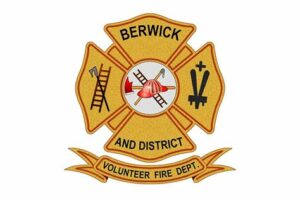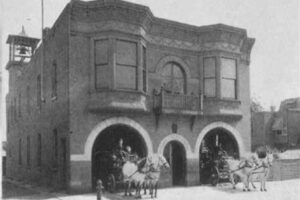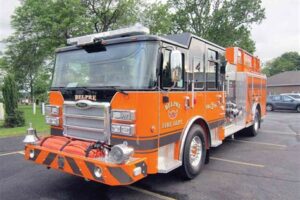Table of Contents
In the United States, volunteer fire departments are overseen by various entities at the local, state, and federal levels. These entities include local government authorities, fire commissioners, state fire marshal’s offices, and national organizations like the National Volunteer Fire Council (NVFC). They work together to ensure the effectiveness, training, and safety of volunteer firefighters, as well as the overall management and governance of volunteer fire departments.
When it comes to ensuring the safety and well-being of our communities, volunteer fire departments play a crucial role. These selfless men and women dedicate their time and skills to protect lives and properties without expecting any monetary compensation. However, have you ever wondered who oversees these volunteer fire departments? Who ensures they are equipped with the necessary resources and training to effectively respond to emergencies? It is a question that deserves our attention and understanding, as the answer sheds light on the intricate system that supports our local heroes.
Introduction
In many communities across the United States, volunteer fire departments play a vital role in ensuring public safety. These individuals selflessly dedicate their time and effort to protect their fellow citizens from fires and other emergencies. While the dedication of volunteers is commendable, it raises the question of who oversees these volunteer fire departments. In this article, we will explore the various entities that provide oversight and guidance to these organizations.
The National Fire Protection Association (NFPA)
The National Fire Protection Association (NFPA) is a leading organization that sets standards and best practices for fire prevention and safety. Although the NFPA does not directly oversee volunteer fire departments, they provide guidelines and recommendations that these organizations often follow. Many states and localities adopt NFPA standards as part of their regulations, indirectly influencing volunteer fire department operations.
State Fire Marshal’s Office
At the state level, the State Fire Marshal’s Office typically assumes responsibility for overseeing all fire departments within its jurisdiction, including volunteer fire departments. This office ensures compliance with state laws and regulations, conducts inspections, and provides training and certification programs for firefighters. The State Fire Marshal’s Office plays a critical role in maintaining the integrity and effectiveness of volunteer fire departments.
Local Government
Local governments, such as cities, towns, or counties, also have a significant role in overseeing volunteer fire departments. They provide funding, equipment, and facilities necessary for the departments to operate effectively. Local governments often establish policies and procedures that volunteer fire departments must adhere to, ensuring accountability and proper management.
Board of Fire Commissioners
In some areas, volunteer fire departments are overseen by a Board of Fire Commissioners. This board consists of elected or appointed officials who are responsible for making decisions regarding the department’s operations, budgets, and policies. The Board of Fire Commissioners acts as a governing body, providing oversight and guidance to ensure the volunteer fire department meets the needs of the community.
Insurance Providers
Insurance providers also play a role in overseeing volunteer fire departments indirectly. Many insurance companies offer discounted rates on property and casualty insurance to communities with well-equipped and properly trained fire departments. To qualify for these discounts, volunteer fire departments must meet certain criteria set by the insurance provider. This incentivizes volunteer fire departments to maintain high standards and ensures their readiness to respond to emergencies.
Volunteer Firefighter Associations
Volunteer firefighter associations, both at the state and national level, provide support and resources to volunteer fire departments. These associations often offer training programs, advocacy, networking opportunities, and access to grants or funding. While they may not directly oversee volunteer fire departments, their involvement strengthens the capabilities and professionalism of these organizations.
Mutual Aid Agreements
Volunteer fire departments often enter into mutual aid agreements with neighboring fire departments or emergency response organizations. These agreements allow departments to share resources, personnel, and expertise during emergencies or large-scale incidents. By working together, volunteer fire departments can enhance their capabilities and ensure effective response and coordination in times of need.
Community Engagement
The community itself plays a vital role in overseeing volunteer fire departments. Citizens can engage with their local department through various means, such as attending open houses, participating in fire prevention programs, or joining volunteer committees. This engagement fosters transparency, builds trust, and allows the community to have a voice in shaping the operations and priorities of their local fire department.
Continuous Training and Evaluation
Perhaps one of the most critical aspects of overseeing volunteer fire departments is continuous training and evaluation. Training programs ensure that firefighters maintain the necessary skills and knowledge to perform their duties safely and effectively. Regular evaluations, both internally and externally, assess the department’s performance, identify areas for improvement, and ensure compliance with standards and regulations.
Conclusion
While there is no single entity solely responsible for overseeing volunteer fire departments, a combination of organizations and stakeholders work together to ensure their effective operation. From national associations to local governments and community engagement, these entities play crucial roles in maintaining the safety and well-being of communities served by volunteer fire departments. The dedication and commitment of these volunteers, combined with the oversight provided, ensure that these departments continue to serve as pillars of public safety.
Who Oversees Volunteer Fire Departments?
Subtitle 1: The Role of Local Government in Volunteer Fire Departments
Local governments play a significant role in overseeing volunteer fire departments. They are responsible for establishing and maintaining these departments, ensuring they have the necessary resources, funding, and equipment to effectively respond to emergencies. Additionally, these authorities appoint fire chiefs and other officials who supervise the daily operations of the department, coordinate training programs, and enforce safety regulations. Through their involvement, local governments provide crucial support and guidance to ensure the smooth functioning of volunteer fire departments within their jurisdictions.
Subtitle 2: State Fire Marshals and their Involvement in Volunteer Fire Departments
State fire marshals also have a crucial role in overseeing volunteer fire departments. They are responsible for enforcing fire prevention and safety codes, conducting inspections, and establishing standards for training, equipment, and response times. In addition to these regulatory responsibilities, state fire marshals often provide financial aid and resources to support the development and operations of volunteer fire departments within their jurisdiction. Their involvement ensures that volunteer fire departments adhere to established standards and remain well-equipped to handle emergencies.
Subtitle 3: National Fire Protection Association and Volunteer Fire Departments
The National Fire Protection Association (NFPA) serves as a trusted authority in the oversight of volunteer fire departments across the country. They establish consensus codes and standards, conduct research, and provide training and educational resources to ensure the safety and effectiveness of these departments. While their influence is mainly advisory, many volunteer fire departments voluntarily adhere to NFPA’s guidelines to enhance their capabilities and maintain a high level of professionalism. The NFPA’s involvement contributes to the overall oversight and improvement of volunteer fire departments nationwide.
Subtitle 4: Distinguishing Oversight Responsibilities of Fire Chiefs and Officers
Within volunteer fire departments, fire chiefs and officers are entrusted with overseeing the day-to-day operations and ensuring compliance with regulations. Fire chiefs, in particular, have the responsibility of managing personnel, resources, and emergency response activities. They are the leaders who make critical decisions during emergencies and ensure that the department operates efficiently. Officers, on the other hand, focus on training, maintaining equipment, and enforcing safety protocols. Working closely with fire chiefs, they contribute to the overall oversight and functioning of the department.
Subtitle 5: Mutual Aid Agreements and Regional Collaboration
Volunteer fire departments often collaborate within their regions through mutual aid agreements, allowing them to share resources and personnel during emergencies. These agreements provide a framework for coordinating responses, ensuring efficient utilization of available resources, and resolving jurisdictional concerns. Through such collaborations, the collective oversight effort becomes more robust and dynamic, enhancing the overall effectiveness of volunteer fire departments, especially in rural or remote areas. Regional collaboration plays a crucial role in overseeing and supporting volunteer fire departments in providing timely and effective emergency services.
Subtitle 6: Civilian Boards and Oversight Committees
In some areas, oversight of volunteer fire departments is carried out by civilian boards or oversight committees. Comprising elected officials, community members, and representatives from local government, these groups provide an additional layer of supervision and help ensure transparency and accountability. They may be responsible for establishing department budgets, reviewing policies, and addressing any concerns raised by community members regarding the operations and performance of the volunteer fire department. Civilian boards and oversight committees contribute to the democratic oversight of volunteer fire departments, ensuring that they serve the best interests of the community.
Subtitle 7: Accreditation and Professional Organizations
Certain professional organizations, such as the Commission on Fire Accreditation International (CFAI), offer accreditation and evaluation programs for volunteer fire departments. Earning accreditation from such organizations demonstrates a department’s commitment to meeting established quality standards, enhancing professionalism, and continuously improving services. These programs also involve external assessors who examine various aspects of department operations, further contributing to the oversight of volunteer fire departments. Accreditation and evaluation programs provide an objective assessment of a department’s performance and contribute to its ongoing improvement.
Subtitle 8: Community Involvement and Citizen Oversight
Beyond institutional oversight, community involvement plays a vital role in monitoring and overseeing volunteer fire departments. Active participation from residents allows for open dialogue, feedback, and suggestions to ensure the fire department’s services align with community needs. Through organized citizen oversight groups, communities can voice concerns and collaborate with fire departments to improve emergency response strategies, leading to a stronger bond between the department and the community it serves. Community involvement and citizen oversight contribute to the accountability and effectiveness of volunteer fire departments, ensuring they meet the specific needs and expectations of their respective communities.
As a journalist, it is crucial to shed light on the important role and operations of volunteer fire departments. These dedicated individuals selflessly give their time and effort to ensure the safety and well-being of their communities. When considering who oversees these volunteer fire departments, several key points come to mind:
1. Local Government Authorities
The primary oversight of volunteer fire departments typically falls under the jurisdiction of local government authorities. These can include city councils, county commissions, or other elected officials responsible for managing public services within a specific area. They allocate funding, set policies, and establish guidelines for the functioning of these departments.
2. Fire Chiefs and Officers
Volunteer fire departments are led by experienced individuals who serve as fire chiefs or officers. These professionals are responsible for overseeing the day-to-day operations, training, and management of the department. They ensure that volunteers are trained, equipment is maintained, and emergency response protocols are followed.
3. Volunteer Firefighter Associations
Many volunteer fire departments have associations or organizations that provide additional oversight. These associations often work closely with government authorities and fire chiefs to advocate for the needs of volunteer firefighters. They may support fundraising efforts, offer training resources, and act as a collective voice for the volunteers.
4. State Fire Marshal’s Office
In some jurisdictions, the state’s fire marshal’s office plays a role in overseeing and regulating volunteer fire departments. They ensure that the departments adhere to state laws, safety standards, and certification requirements. The state fire marshal’s office may conduct inspections, provide training resources, and offer guidance on best practices.
5. Community Involvement
While not directly overseeing volunteer fire departments, community involvement is crucial in supporting and sustaining these organizations. Local residents often participate in fundraising events, donate equipment or funds, and provide moral support. Their engagement helps maintain the viability and effectiveness of the volunteer fire departments.
In conclusion, volunteer fire departments are overseen by a combination of local government authorities, fire chiefs/officers, volunteer firefighter associations, state fire marshal’s offices, and community involvement. These various entities work together to ensure the safety and efficiency of these essential community services.
Thank you for taking the time to visit our blog and learn more about the crucial role of volunteer fire departments in our communities. The dedication and selflessness exhibited by these brave men and women are truly commendable, as they work tirelessly to protect lives and property without expecting anything in return. However, have you ever wondered who oversees these volunteer fire departments? In this closing message, we will shed light on this important aspect that often goes unnoticed.
While volunteer fire departments may not have a specific entity overseeing their operations at the national level, they do have various mechanisms in place to ensure their effective functioning. At the local level, these departments are typically governed by a board of directors or a fire district’s board of commissioners. These individuals are responsible for making decisions related to funding, equipment procurement, and overall management of the department.
In addition to the local oversight, volunteer fire departments also rely on support and guidance from regional and state-level organizations. These organizations often provide training and certification programs, establish standards and protocols, and offer resources to enhance the capabilities of volunteer firefighters. By unifying efforts and sharing best practices, these organizations play a crucial role in overseeing the operations of volunteer fire departments across a wider area.
It is important to note that while oversight is vital to ensure accountability and proper functioning, it should not hinder the spirit of volunteerism that drives these departments. Volunteer firefighters are motivated by their passion for serving their communities and helping others in times of crisis. They dedicate countless hours to training, responding to emergencies, and supporting their fellow firefighters. Their commitment and sacrifice are what make volunteer fire departments an invaluable pillar of our society.
In conclusion, although there is no single overarching authority that oversees all volunteer fire departments, the local boards of directors or commissioners, as well as regional and state-level organizations, play a significant role in ensuring their smooth operation. These dedicated individuals and organizations work hand in hand to provide the necessary support, training, and resources that allow volunteer firefighters to fulfill their vital role in protecting our communities. We must always appreciate and support these unsung heroes who put their lives on the line every day without expecting anything in return.
Once again, thank you for joining us on this journey of exploring the world of volunteer fire departments. We hope this article has provided you with valuable insights and a greater appreciation for the incredible work done by these selfless individuals. Please continue to support your local volunteer fire department and spread awareness about their importance in safeguarding our communities. Together, we can make a difference!
Video Who Oversees Volunteer Fire Departments
1. Who oversees volunteer fire departments?
Volunteer fire departments, like their name suggests, are managed and overseen by a variety of individuals and entities to ensure their effective operation. Here are some key stakeholders involved:
- Local Government Authorities: Volunteer fire departments typically fall under the jurisdiction of local government bodies such as city councils, town boards, or county commissions. These authorities hold the primary responsibility for overseeing and providing support to these departments.
- Fire Chiefs and Officers: Within the volunteer fire department itself, the leadership team headed by the fire chief plays a critical role in overseeing day-to-day operations. Fire chiefs and officers are responsible for managing personnel, coordinating emergency responses, and ensuring compliance with established standards and protocols.
- Fire Associations and Organizations: Many volunteer fire departments are affiliated with regional or state-level fire associations or organizations. These bodies provide additional oversight, guidance, training, and resources to member departments, promoting best practices and professional development among volunteers.
- Insurance Providers: Insurance companies often have a vested interest in the safety and preparedness of volunteer fire departments within their coverage areas. They may conduct inspections, offer risk management advice, and establish guidelines that departments must follow to maintain insurance coverage.
- State Fire Marshal’s Office: In some countries, there may be a State Fire Marshal’s Office or equivalent regulatory authority responsible for overseeing all fire departments, including volunteer ones. These agencies set standards, conduct inspections, and ensure compliance with fire safety regulations.
By working together, these various entities help ensure that volunteer fire departments receive the necessary oversight, support, and resources to fulfill their vital roles in protecting communities.






